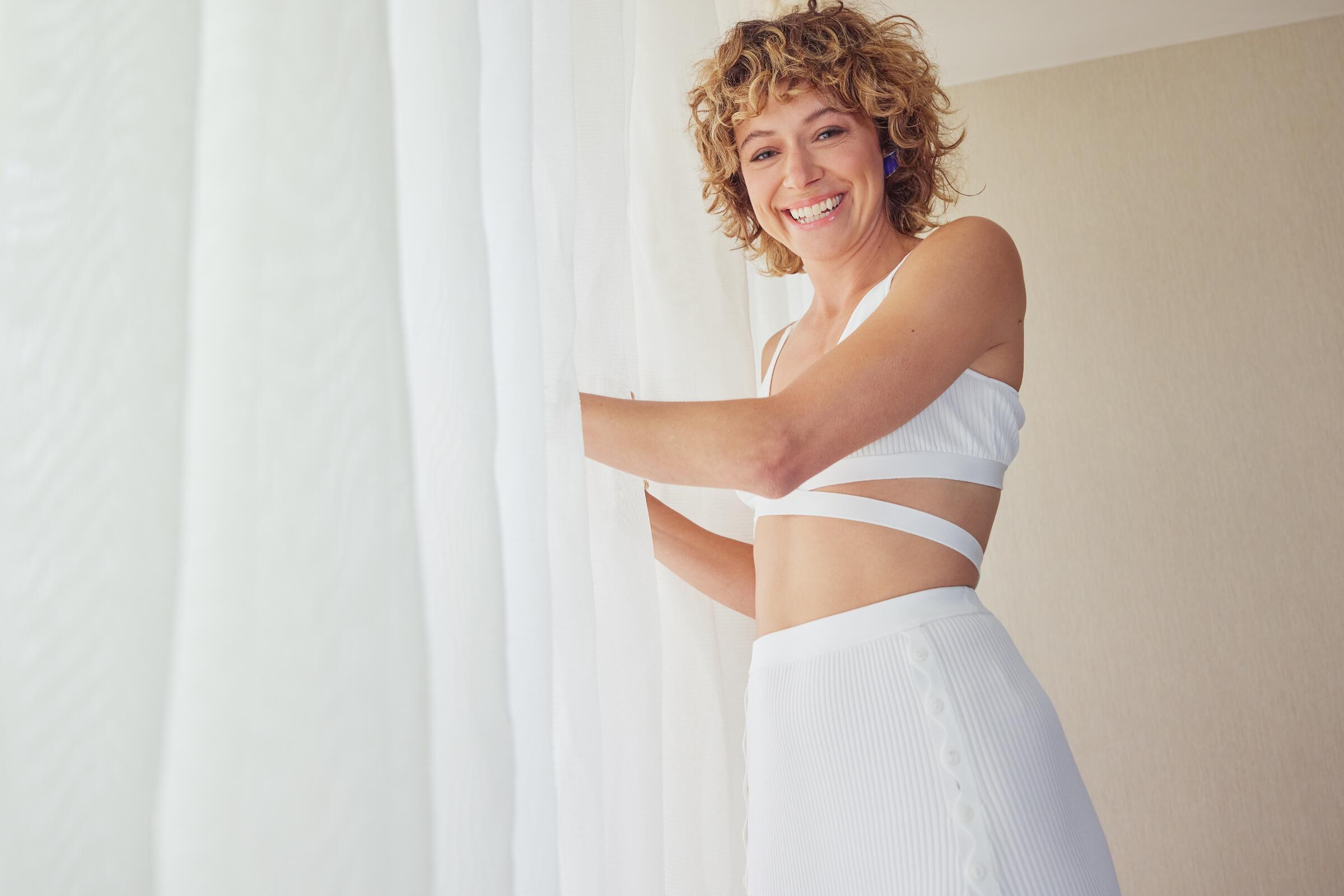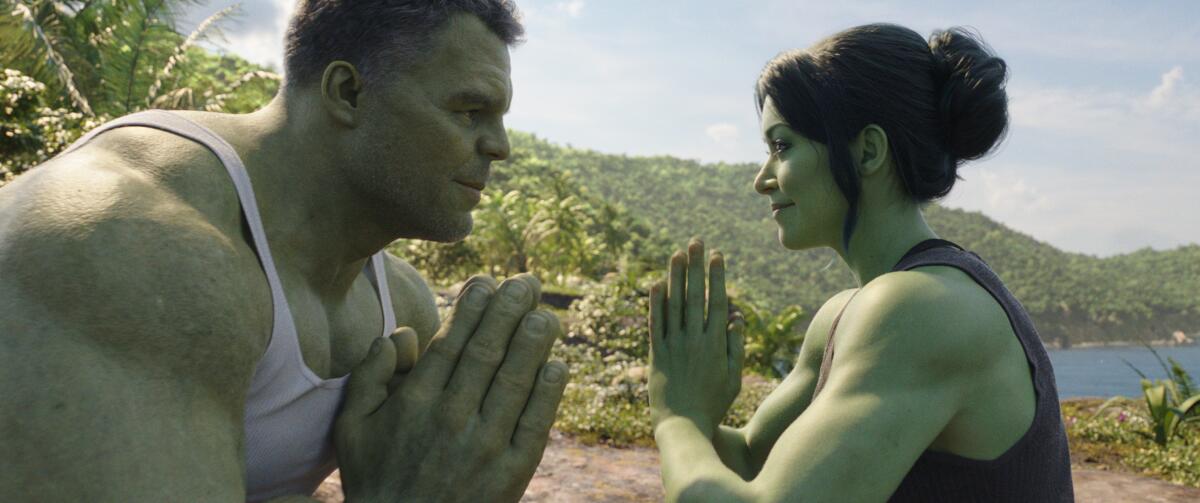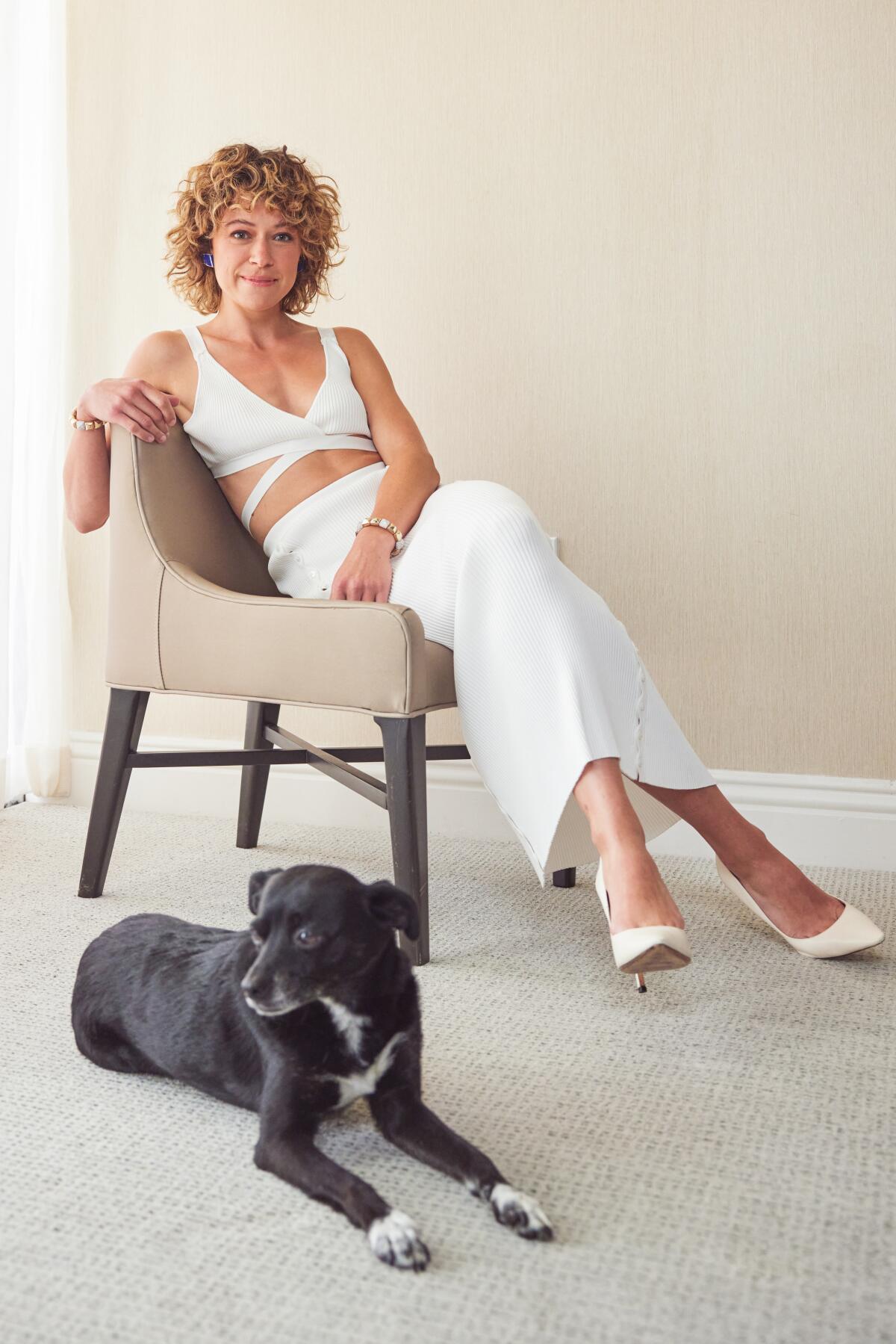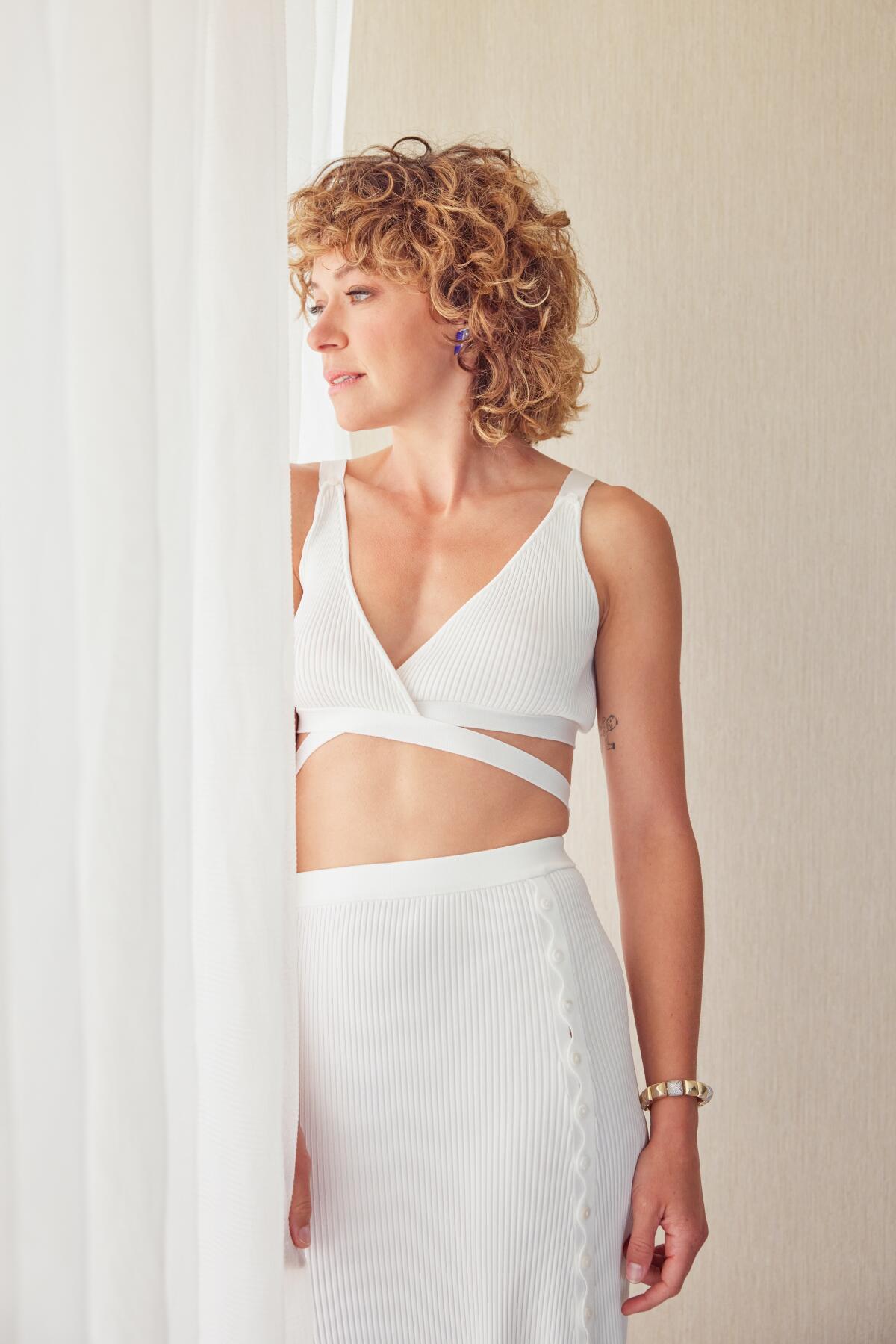The complete guide to home viewing
Get Screen Gab for everything about the TV shows and streaming movies everyone’s talking about.
You may occasionally receive promotional content from the Los Angeles Times.

Long before “She-Hulk,” Tatiana Maslany had an affinity for mean, green fighting machines.
The Emmy Award-winning actor was a serious “Teenage Mutant Ninja Turtles” fan as a kid, and to this day she happily admits her fondness for the quartet of pizza-loving superheroes in a half-shell. She’s quick to name 1991’s “Teenage Mutant Ninja Turtles II: The Secret of the Ooze” as her favorite of the franchise, even though it’s “the one that everybody kind of doesn’t like.”
More perfectly, Maslany’s favorite out of the brothers is the sai-wielding, short-tempered Raphael. Her affection runs so deep that when 1993’s “Teenage Mutant Ninja Turtles III” comes up in conversation, she easily recalls a moment in the film when Raph shows his softer side while connecting with a kid that she found moving.
“I thought he was so hot for some reason,” Maslany admits with a laugh during a recent video call, “which I feel like says terrible things about the people I’m attracted to.”
TV critic Lorraine Ali and staff writer Tracy Brown discuss the Disney+ series’ many representational milestones and what it all means for Marvel.
This love for the Ninja Turtles may explain why she decided to makeher superhero debut as Jennifer Walters in the upcoming Disney+ series “She-Hulk: Attorney at Law” from Marvel Studios. There’s a clear affinity there.
Hailed as the Marvel Cinematic Universe’s first proper half-hour sitcom — “WandaVision” being more of a meta-sitcom, if we’re being honest — “She-Hulk,” created for television by Jessica Gao, follows Walters after she gains the ability to transform into a green, super-powered, 6-foot-7 version of herself following an accident. Whereas the Ninja Turtles’ origin story involves their exposure to radioactive ooze, Walters’ life is changed after coming into contact with her cousin Bruce Banner’s gamma radiation-infused blood.

Banner, portrayed by Mark Ruffalo, is better known as the Hulk, an MCU mainstay and a member of the Avengers whose anger triggers his transformation into a super-powered giant with green flesh and, initially, a separate personality that he cannot control.
It was the idea of unpacking what this physical transformation meant for Walters that convinced Maslany she had to audition for the role.
“There’s so much conversation around women’s bodies and bodies in general,” says Maslany, pointing toward the response to the show’s trailer as an example. “That’s the juiciest thing that this show can talk about. The perception and what it is to occupy a different body and to be received, societally, differently. The expectations we have on women’s bodies, and what they mean about how we can treat them.”
“I really think that a big part of identity is not only what you think and how you feel and how you move in the world, but also how the world receives you and what the world is giving back to you,” says Gao. “Both of those things shape a person’s sense of self, and [She-Hulk] is an extreme physical version of that. … Even if she’s the same person on the inside, it does change how she acts and how she thinks because of how the outside world treats her, and that’s a lot that she’s going to have to grapple with emotionally.”
Gao’s comedic approach to these themes, which is “very human and relatable,” was something Maslany had not expected from a superhero series. So, despite her general reticence about auditioning for something with the scale of a Marvel project, she knew she had to try out for the role.
Maslany is best known for starring in “Orphan Black,” playing more than a dozen characters over the course of the series’ five-season run — and rarely just one at a time. The superhuman feat won her an Emmy Award in 2016, two more nominations, multiple Critics Choice Awards and more. Despite that breakthrough, though, she admits she has never felt drawn to the bigger projects and that she finds as much excitement in smaller, independent short films as she does in productions of a grander scale.

Maslany started acting as a child while growing up in Regina, in Saskatchewan, Canada; she says she joined “every improv team … and every community theater young people’s group that [she] could be a part of.” She suspects it was the thrill of being in front of an audience that really spoke to her and kept her acting in her youth.
Despite working consistently since age 9, Maslany says that she didn’t start understanding and studying acting as a craft in earnest until she was an adult, and points to John Cassavetes’ “A Woman Under the Influence” as the catalyst.
“It offered up to me the possibilities of what this art form can be,” she says. ”That it can have freedom in it and this abandon and loss of holding that is so electric to witness. And so much about connection and humanity. I think now, for me, it’s really about connecting with people in a moment on screen that I find so exciting.”
Maslany admits she has more fun in interviews when she gets to nerd out about her work, and our conversation easily flows through discussions about the way the themes of “Orphan Black” — a series about autonomy and identity and exploring the multiple possibilities contained within one person — relate to “She-Hulk’s” exploration of bodies and perception. And how trans musician Sophie, with her layered sounds and the experimental nature of her work, was an inspiration as she played She-Hulk. And even how the gray motion-capture suit she had to wear for scenes in which Walters is She-Hulk helped inform her portrayal of someone who feels a bit like an outsider in her larger green form.
For all of the accolades, though — from the Television Academy, from TV critics, from “Orphan Black’s” Clone Club of fans and her “She-Hulk” colleagues, who often preface their praise by admitting it might be too effusive to be believed — Maslany is as nice of a person as you would hope. Those who have worked with her are quick to point out her interpersonal strengths: her kindness, her empathy and her ability to connect with people and to be present as both an actor and friend.
“Her craft is so fine-tuned,” says Anu Valia, who directed three episodes of “She-Hulk.” “You can see her listening all the time. There was never one take where I felt she was phoning it in, or I felt she wasn’t listening, even in a silly, funny, quick little scene, which is marvelous. I don’t know who has the stamina to do that.”
Valia adds that as a friend, “she [also] brings that ability to be incredibly present into her personal life. So when you talk to her, you feel like you’re the only person in the world. And she gets so deep with you and listens to you.”
Ginger Gonzaga, who plays Walters’ best friend Nikki in the series, describes Maslany as “very much the real deal” and “the type of person I like working with as an actor … because she’s instantly vulnerable and very limitless.
“She’s an honest, soulful, vulnerable, intelligent, caring actor and person,” says Gonzaga, who is thrilled that Nikki and Walters share a genuinely caring adult friendship on the show. “I feel like she’s doing exactly what she’s supposed to do in her life and she also uses that platform wisely.”

That platform has allowed Maslany the ability to speak frankly about allegations of poor working conditions for visual effects artists working on Disney projects like “She-Hulk,” which itself has come under criticism of its VFX. In this, she’s been joined in expressing solidarity by executive producers Gao and Kat Coiro.
“I think that there are incredibly difficult working conditions, and if you don’t have the protection of a union, then you can be taken advantage of,” says Maslany, who adds that it is thanks to visual effects artistry that her performance can be translated through layers of CGI. “I’m just so in awe of what they’re able to do with very little support in that sense. I know that my union, as an actor, is incredibly important to me. … I think it’s really important to have those systems in place that protect people and that ascribe their skills value and respect.”
There is also a promotional “She-Hulk” featurette in which Maslany is seen wearing a shirt that reads, “Support Trans Futures.” She saw it as an opportunity to reach an audience and show the community she stands with them as an ally. Better still if being clear in her beliefs can contribute even in a small way to help make change.
“I’m aware of what reach images like that have and I’m aware that there have been bills passed in Florida that Disney has been connected to in terms of providing money to [politicians that passed] anti-LGBTQ bills,” says Maslany. “I know how little it costs me to do something like that. I’m incredibly privileged and I’m very fortunate to have the platform I do. And I’m very supportive of people who are fighting on the ground for LGBTQ rights. That community means a lot to me and if there’s any way that I can continue to voice my allyship then I’ll do it.”
Maslany’s thoughts on doing good in the ways that she can reflect the questions Walters will likely have to confront over the course of “She-Hulk.” Walters, a lawyer dedicated to justice in a court of law, doesn’t believe she should have to give up that commitment just because she’s gained superpowers. But as with fame, that doesn’t mean it will always go smoothly.
“She has a life that she really cares about,” says Maslany. “She doesn’t want to have to do this other thing that feels very foreign to her and like it doesn’t fit.”
The complete guide to home viewing
Get Screen Gab for everything about the TV shows and streaming movies everyone’s talking about.
You may occasionally receive promotional content from the Los Angeles Times.